I realized that kettlebells were everything I needed at that point because I was coming off of physical therapy for a knee problem—not a major injury—but for a patellar tracking issue. The physical therapists told me that I needed to build up my glutes and quads, but weren’t giving me a lot of specific information on how to do it. So, when I stumbled across kettlebells they literally changed every bit of my life.
Dragon Door: And they seem to have lead to a career change as well?
Shari Wagner: Yes, a big one! It took a while, because I was just enjoying the training and seeing the results I was getting. I had been unhappy in my career in the fashion industry, and it wasn't fulfilling for me anymore. While trying to discover what I wanted to do next at the age of almost 40, I walked into the kettlebell class one day and noticed how happy my
trainer was. I remembered that he had also come from the corporate world, but that he loved his job as a trainer now. A little light bulb went on in my head and I thought that if he could do it, I could do it too. I had some conversations with a counselor I had been seeing at the time and she said that this was the first time she saw me really light up about anything. So, I talked to my trainer about it, and RKC training was on!
Dragon Door: How long did you have to prepare for the RKC?
Shari Wagner: About 6 months, and I did it in the April of 2009 in Minnesota—back then there weren’t as many choices so it was either St. Paul or San Jose. Also back then the workshops were the big 60-100 or more people ones. I wish I had had the opportunity to do one of the smaller more intimate
RKC Workshops like we have now.
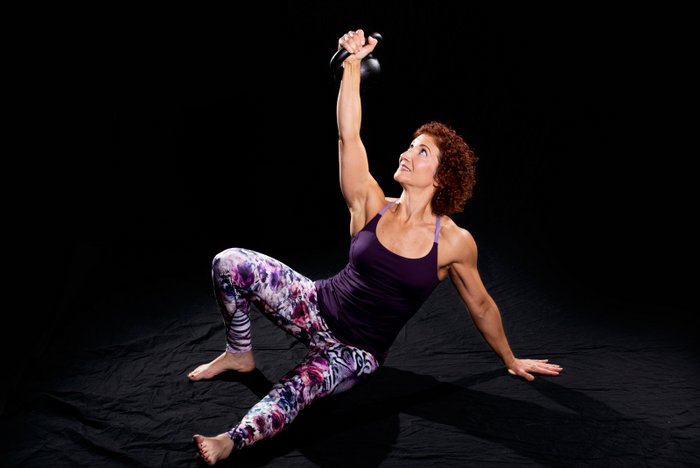
Dragon Door: You mentioned earlier that kettlebells changed everything, other than the giant career change what else changed?
Shari Wagner: Well at first, I noticed the results I was getting and that I was starting to have muscles! It was also the first time I started to understand what it meant to be and feel strong. Before kettlebells, I’d just done mindless exercises, I may have been using weights, but I didn’t know how to use them to get strong. I had been doing "beach muscle" workouts, so I may have looked good but I wasn’t functioning better or getting strong before kettlebells.
In early 2001, I was struggling with my weight for the first time, then I was diagnosed with PCOS. I changed the way I dieted based on what I learned about the condition. I was able to manage my weight, but it became much easier with
kettlebell training. By building muscle and changing how my body worked metabolically, it helped me manage the PCOS symptoms.
Kettlebells also transformed me from "skinny fat" to strong and muscular. I also overcame the osteopenia in my spine and my hip. The training has completely reversed it in my spine. The osteopenia in my hip was very significant, and scary—but it’s still improving which is another huge way kettlebells have changed me.
Getting stronger has been so empowering. I can be strong on the outside, but I am strong on the inside too. I’m now more adventurous. Before kettlebell training, I didn’t do anything athletic or even work out regularly. I was relatively sedentary, and had no confidence that my body could do much. I used to see people do physical feats and think I could never do them too, now I want to try. I’m willing to conquer my fear to try something that seems like it might be fun or interesting. I can now push myself to limits I didn’t think I could do before.
I have also overcome a lot of confidence issues. At my first RKC, during the
snatch test, I dropped the kettlebell with only two snatches left—and my hands were really torn up and painful, so I didn’t earn my certification at that workshop. Unfortunately I let this fact really get to me, when it really wasn’t a big deal at all. A year later, I talked to my team leader from that workshop and told him how I had been feeling about the test. He told me that I needed to just get over it! At first I thought that wasn’t helpful advice, but then I started to explore how to get over it. After some introspection I realized that part of it was letting my nerves get the better of me—especially when my heart rate was high. High rep snatching then made this even more difficult. So, I thought if I could build up my endurance more, then it would be a less of a big deal.
I also decided to learn how to keep calm when my heart rate goes up. Now when my nerves start to kick in, I can keep more control. I learned to use some meditative techniques in a meditation class while sitting calmly, then also practiced them under duress. Sitting calmly in meditation before the test also helped keep my mind focused on my breathing and technique. I also had to remember that the instructor wasn’t judging me as a person, they were counting my reps and making sure my technique was correct. The more I could keep calm in a testing scenario, the more confident I became in my abilities—not just my own technique, but as a coach too. Working on this has made me grow so much.
Dragon Door: What happened after you earned your RKC?
Shari Wagner: I was still working fulltime, while starting to
build my business. At first I just started training friends and family either at my home or theirs because I didn’t have a place to train yet. One of the great things about kettlebells is that you can train with them anywhere. Sometimes we would train in the park when the weather was nice.
Then, in a roundabout way, the CFO of my company found out about my RKC certification. He wanted to start a corporate wellness program and asked me to teach. At first I was hesitant to mix the two worlds, but I decided to try it. The program ended up being pretty successful. People were starting to lose weight, and some were even able to go off of blood pressure and other medications. It was really cool to see very positive benefits in the workplace from the program. I also developed new and better relationships with my coworkers.
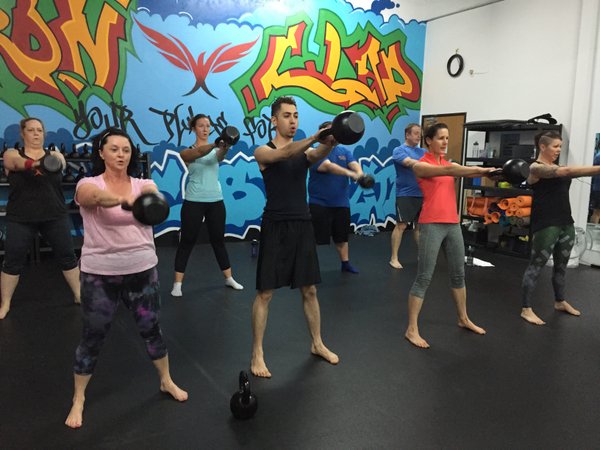
Dragon Door: What a great way to gain experience as an instructor! How did you decide to open your own gym?
Shari Wagner: When I left the company, the CFO wanted me to keep teaching kettlebells. People were really upset that I was leaving—they were happy for me but were also in a panic because they wanted to continue kettlebell classes. So, to this day I still teach there twice a week. I opened my gym in August of 2012. I had wanted to open a gym for many years, but it was finally the right time.
Dragon Door: Now you've been an RKC Team Leader for a while now, when did you get promoted?
Shari Wagner: That was January of this year.
Dragon Door: You recently hosted an RKC at your facility, how many have you hosted by now, and what do you like most about hosting?
Shari Wagner: This was my fourth year in a row hosting. I get to experience the RKC all over again when I host. There's always something new to learn, a new cue that the master instructor brings, or maybe something I forgot and will remember. There are so many pearls of wisdom that come back each time. I love staying current on the content and the way that it’s taught. Each workshop has a different group of participants from different walks of life, backgrounds, and ability levels, so we learn from them too. Experiencing the RKC again every year has been really valuable to me as a coach and I feel like it has helped my career, and what I bring to my clients.
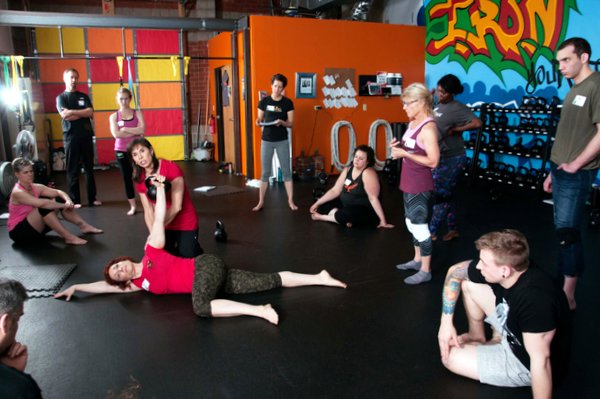
Dragon Door: Who do you usually train at your gym, is there a pattern to who comes to train with you?
Shari Wagner: Definitely, and it's kind of funny because it isn’t really intentional. For whatever reason, more women contact me and they usually fit the profile of how I used to be—little to no experience with training, looking to lose some weight, and between the ages of 35-65. I have some outside that demographic younger or older. Some of my
older clients come from an athletic background and love how kettlebells keep them athletic—and then some of my 60 year olds are finding strength for the first time.
I do tend to attract people who want a more personalized experience than a typical gym scene. Now I am starting to get people who are just seeking out fitness in a certain environment, and may or may not be specifically searching for kettlebell training.
Dragon Door: What are you doing differently at your gym to create this kind of experience or environment?
Shari Wagner: I keep the classes small so I can give my best instruction and experience. I don’t want people to feel like they’re just another face in the crowd—I want them to feel like they are in a comfortable place where they belong with no intimidation. Obviously, specializing in kettlebells is a completely different than what they will find at a typical gym. I mix in battling ropes, bodyweight and TRX. Since I went to the PCC, I have also been adding more
bodyweight exercises to the workouts, but the meat and potatoes of what I do is kettlebells. Plus, I include nutrition coaching in my memberships.
Dragon Door: I was so glad to see you at the New York PCC this year, how did you decide to attend?
Shari Wagner: I had wanted to go for a very long time—ever since I heard the feedback from the first
PCC Workshop. At first I wasn’t sure what it was all about or if it was in my wheelhouse, but after seeing the pictures and hearing the stories, I definitely wanted to do it. Then after reading more articles and books from the
Kavadlo brothers, I really had to do it! After meeting them at least year’s Health and Strength Conference, I knew I wanted to go to a PCC in 2016. And it was so much fun to finally learn from you in person!
Dragon Door: What are you working on now in your own training?
Shari Wagner: Right now I'm working to see where I can take my max press and I am still trying to hit a freestanding handstand. I'm making progress, I was able to kick up and not immediately hit the wall. Kirsty Grosart is coming out to do a handstand workshop here at my gym.
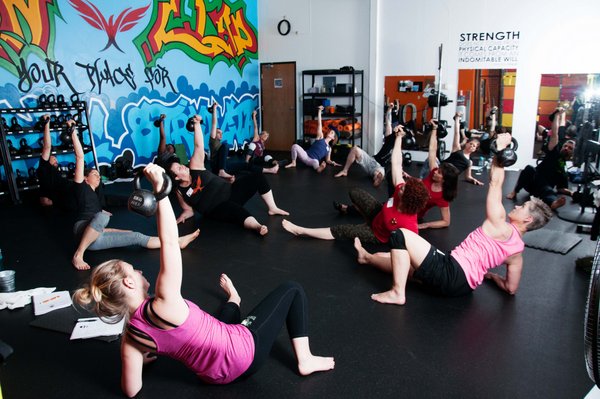
Dragon Door: What else is next for you and your gym?
Shari Wagner: I want to continue to grow and help more people! I would specifically like to serve more veterans. I've done a couple of fundraisers, but I would really like to have more clients who are veterans or active duty, it’s a demographic I feel passionate about. I also feel passionate about helping other women who have PCOS.
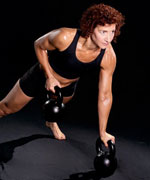 Shari Wagner, RKC Team Leader, PCC Instructor, CK-FMS, Precision Nutrition Level 2 Coach owns Iron Clad Fitness in Denver, Colorado. She trains groups and individuals. She can be contacted through her website at IronCladFit.com, email shari@ironcladfit.
Shari Wagner, RKC Team Leader, PCC Instructor, CK-FMS, Precision Nutrition Level 2 Coach owns Iron Clad Fitness in Denver, Colorado. She trains groups and individuals. She can be contacted through her website at IronCladFit.com, email shari@ironcladfit.